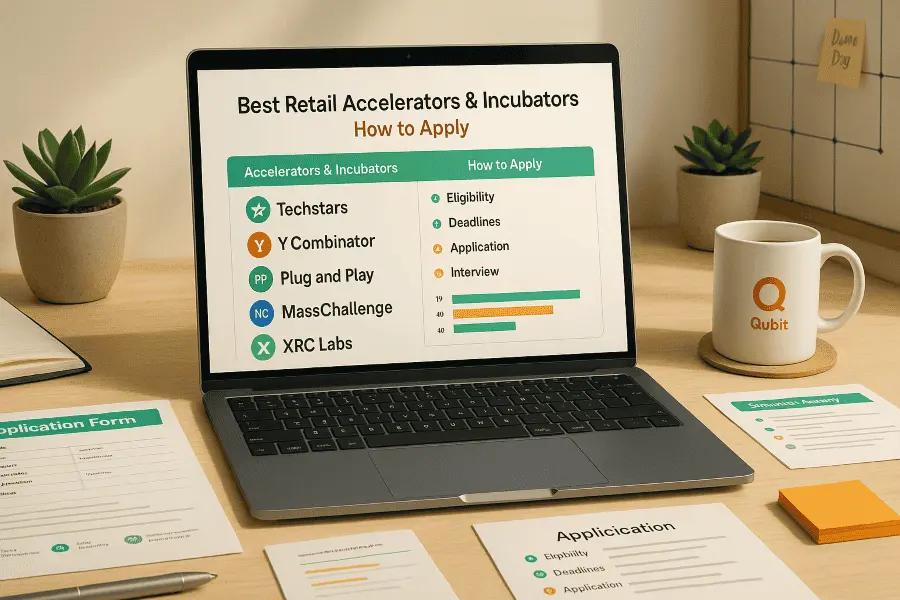Retail accelerators and incubators have become vital resources for startups aiming to scale quickly in a competitive market. With the global startup accelerator market projected to grow from USD 5.02 billion to USD 11.04 billion by 2034, the significance of these programs is undeniable. These platforms offer mentorship, funding, and networking opportunities tailored to the unique challenges of retail businesses.
This article explores how retail accelerators and incubators empower startups, providing actionable insights into the application process. Whether you're seeking funding or strategic guidance, understanding these programs can be transformative. For additional funding options, retail VC firms also play a key role in supporting retail-focused ventures.
Let’s dive in!
Why Accelerators & Incubators Matter for Retail Startups
Getting your retail startup off the ground is hard. You need capital, deep industry know-how, distribution channels and a network of buyers—all before you’ve even sold your first unit. That’s where accelerators and incubators come in:
- Mentorship & Expertise
Seasoned retail operators, merchandisers and data analysts sit on your side of the table. - Funding & Perks
Seed grants, office space, cloud credits and discounted services take the financial pressure off early. - Networking & Demo Days
Investor showcases, corporate partners and buyer introductions turn “cold calls” into “meet and greets.”
For retail founders, these programs aren’t just nice to have—they can be the single biggest catalyst for growth in your first two years.
Accelerator vs. Incubator: Picking the Right Path
Before diving into specific programs, you need to understand the key differences:
| Aspect | Accelerator | Incubator |
|---|---|---|
| Duration | 3–6 months | 6–24 months |
| Equity | Typically 5–10% in exchange for funding | Often free or small equity stake |
| Focus | Rapid product‐market fit & fundraising | Early‐stage R&D, prototypes, workspace |
| Cohort Model | Fixed-term, group of startups | Flexible entry, individual pacing |
| Demo Day | Yes, culminating in investor pitch event | Rarely; more ongoing showcase opportunities |
- Choose an accelerator if you have a working prototype, some revenue or pilot customers and you’re aiming to raise a priced seed or Series A.
- Choose an incubator if you’re pre-revenue, experimenting with product concepts or need a supportive space to iterate over a longer timeframe.
How We Picked “The Best” Programs
Our recommendations balance four critical factors:
- Retail Focus & Domain Expertise
Programs run in partnership with major retailers or that specialize in consumer-facing supply chains. - Alumni Success
Startups that went on to meaningful scale or raised follow-on rounds. - Program Perks & Network
Office space, platform credits, corporate pilot opportunities and buyer introductions. - Application Accessibility
Transparent eligibility, clear timelines and ample mentorship.
Target Accelerators Programs
Target’s Accelerator initiative offers two distinct tracks—Forward Founders and Takeoff—tailored to guide retail brands at different stages of development. Each is designed to equip founders with the retail expertise, tools, and connections they need to succeed.
Forward Founders — Getting CPG Brands Ready for Retail
This track targets emerging consumer-packaged-goods companies, especially first-time or under-resourced founders preparing for retail launch. It focuses on retail readiness—including product positioning, revenue models, unit economics, and buyer relationships.
- Program Highlights:
- Provides retail education, with hands‑on workshops, expert mentorship, and peer networking.
- Supports brands through brand development, price setting, packaging optimization, and supply chain basics.
- No equity taken—founders receive full access to program resources with no strings attached.
- Alumni Success:
Small businesses from industries like beauty, food & beverage, and pet care have graduated and secured national shelf placements. - How to Apply:
- Typically opens during spring and fall.
- Watch Target Accelerators’ site or partner community channels for announcements.
Takeoff — Scaling Retail-Ready Brands
Designed for brands that already sell or are launching at Target, Takeoff helps founders shift from launch to long-term growth.
- Program Highlights:
- Offers onboarding support, buyer mentorship, merchandising advice, and go-to-market coordination around launch.
- Hands-on guidance aligns with Target’s merchandising processes and product lifecycle.
- Alumni Success:
Brands from home, food, and wellness categories have launched in-store and online, backed by continuing strategy support. - How to Apply:
- Target notifies brands invited to Takeoff via its supplier channels.
- If you already sell through Target, express interest through your supplier portal.
Top Retail Startup Programs & Investors
Retail startups grow fastest when they combine the right industry programs with smart investor networks. Here’s how founders can find and leverage both.
1. Specialized Retail Accelerators
Programs such as Plug and Play, Techstars Retail, and Fashion Tech Lab are built around co-creating with major retail brands. They typically deliver a mix of capital, mentorship, pilot access, and buyer introductions.
- Search Tip: Use platforms like IncubatorList or Failory’s Retail Tech listing to identify open accelerators by vertical and tech focus.
2. Corporate-Backed Incubators
Big companies like Walmart, Unilever, and Target run incubators focused on procurement, supply chain, or sustainability.
- Approach:
- Monitor their challenge window announcements (e.g., Unilever issues quarterly sustainability challenges).
- Apply with a sharp, mission-aligned pitch—tie your product to the corporate’s strategic priorities.
3. Investor Networks & Platforms
Finding the right investor is more than raising capital—it’s about finding strategic partners.
- Platforms:
- Sites like IncubatorList and fintech ecosystems allow founders to filter VCs by sector, stage, and diversity focus.
- Pro Tip:
- Use platform filters to identify funds that have backed peers in your vertical—these investors understand your market and value-add.
Finding the Right Fit: Search & Filter Tools
Modern startup platforms provide powerful filters for founders to identify programs and investors aligned with their needs:
- Filter by Stage: (e.g., pre-revenue, pilot stage, fundraising stage)
- Filter by Sector: (e.g., food, apparel, eco-packaging, retail tech)
- Filter by Equity & Cost: Some programs (like Target or MassChallenge) are equity-free, which is a major benefit for founders wanting to preserve ownership.
- Filter by Region (even if programs are virtual): Enables founders outside traditional hubs to participate in global cohorts.
By thoughtfully combining these search tools with a clear profile of your readiness and goals, you’ll surface opportunities that fit your growth stage, vertical focus, and capital strategy.
How to Apply: Step-By-Step Roadmap
- Self-Assess Your Stage
- Pre-Revenue & Prototype: Look to incubators (MassChallenge, Store No.8, NYFI).
- Pilot Customers & Traction: Aim accelerators (Plug and Play, Techstars, Target).
- Do Your Homework
- Program Fit: Match your vertical—food, fashion, tech-enablement—to the program’s focus.
- Alumni Checklist: Speak to past participants on LinkedIn. What did they wish they knew?
- Polish Your Materials
- Executive Summary (1 page): Problem, solution, market size, business model.
- Pitch Deck (10–12 slides): Keep slides visual, with clear metrics and buyer interest.
- Demo or Prototype Video: 2 minutes max—show your product in action.
- Network Early
- Webinars & Info Sessions: Attend every open house to meet mentors and ask specific questions.
- Referrals: A warm intro from an alum or partner vastly improves your odds.
- Craft a Tailored Application
- Answer the ‘Why Now?’: Why is your solution ripe for adoption today?
- Quantify Impact: “We reduced stockouts by 20% in a 3-store pilot.”
- Prepare for Interviews & Pitches
- Investor Readiness: Know your numbers—gross margin, CAC, LTV.
- Use Cases & Roadmap: Be ready to co-develop features with corporate partners.
- Post-Acceptance Strategy
- Goal Setting: Define 3–5 KPIs for the program (e.g., “secure 2 pilot accounts”).
- Demo Day Prep: Rehearse a 3-minute pitch and a live Q&A with buyers.
Common Application Pitfalls & How to Avoid Them
- Last-Minute Rush: Applications that arrive hours before the deadline often lack polish. Start 4–6 weeks early.
- Generic Decks: One-size-fits-all decks get filtered out. Tailor each slide to the program’s strategic themes.
- No Traction Proof: Even a simple pilot or LOI shows you’re not selling vaporware.
- Ignoring Corporate Fit: If you can’t articulate how you’ll help the sponsor (e.g., Target, Walmart), you’ll never get beyond screening.
Conclusion
The strategies outlined in this blog highlight the critical role accelerators and incubators play in shaping a startup’s journey. From offering mentorship and funding to fostering invaluable networking opportunities, these programs provide the foundation for growth and innovation. A clear, narrative-driven application approach is equally essential, as it allows startups to effectively communicate their vision and potential impact.
If you’re looking to turn accelerator interest into real momentum, at Qubit we understand mentor fit, demo-day metrics, and narrative-first applications. Level up your chances with our retail fundraising assistance and get a crisp application game plan.
Let us help you turn your vision into reality.
Key Takeaways
- Accelerators and incubators are vital for providing the mentorship, funding, and networking necessary for retail startup success.
- Specialized retail-focused programs deliver curated education and practical tools for scaling brands.
- Real-life success stories, such as Brooklyn Tea and achievements like scaling to over 3,000 retail doors, underscore program efficacy.
- Clear, step-by-step application processes empower startups to navigate competitive retail environments.
Frequently asked Questions
What are the best retail startup accelerators?
The best retail startup accelerators offer a blend of intensive mentorship, funding opportunities, and valuable networking, validated by successful alumni and strong industry partnerships.






